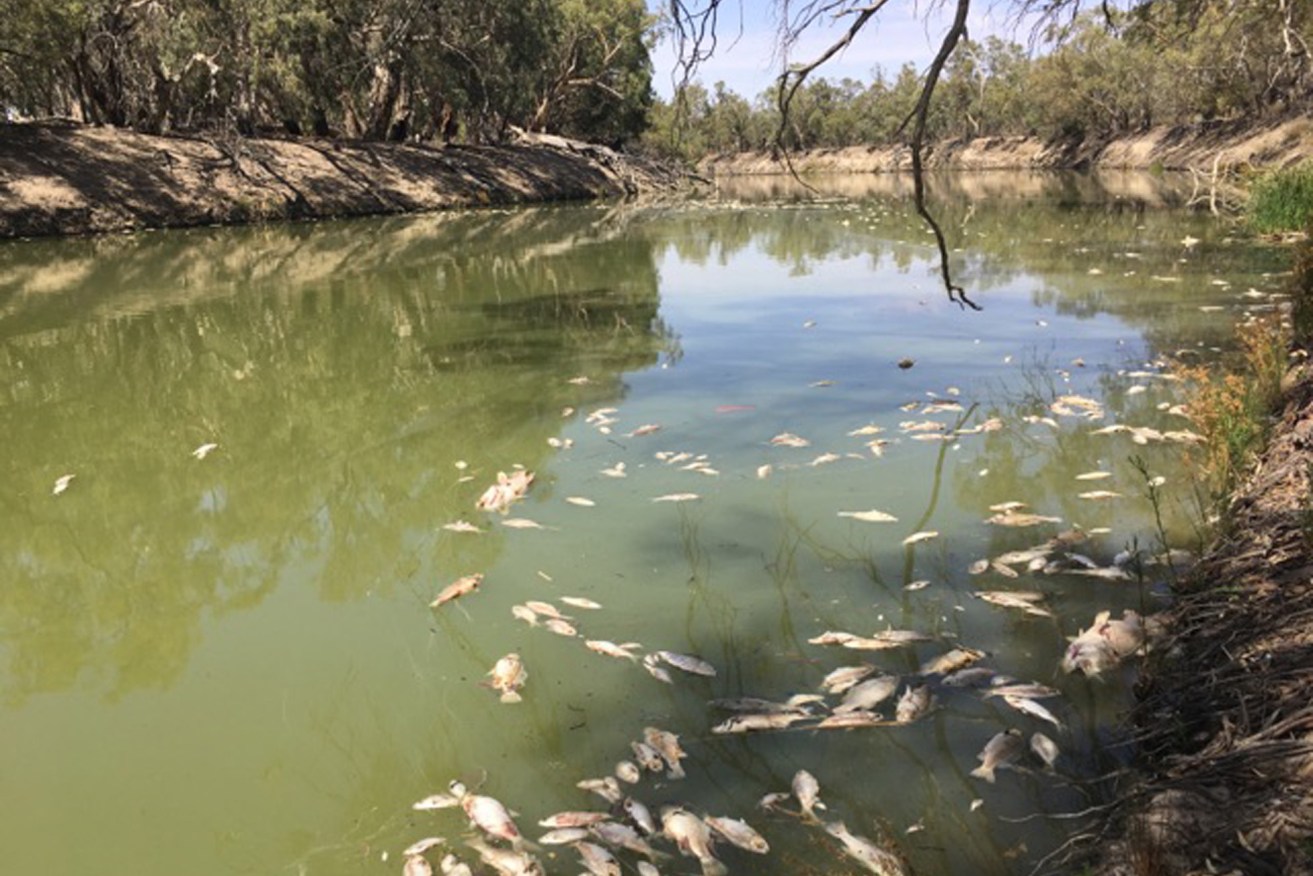Murray Darling disaster a product of Australia’s political malaise
Australia’s political classes preened and postured as the Murray Darling Basin system descended into environmental catastrophe, writes former South Australian water minister Mark Brindal.

The mass death of fish on the Darling River in NSW. Photo: AAP/Supplied by Kate McBride
Bret Walker SC handed the final report of South Australia’s Royal Commission into the management of the Murray-Darling Basin to the Governor yesterday.
Royal Commissions occupy a unique place in the Australian system of government, being the highest form of inquiry on matters of substantial public importance. That the Murray Darling system is of such consequence is beyond dispute.
But I’m prepared to bet my house that the report will contain little that is not already known.
In fact, the establishment of a commission highlights the malaise currently affecting Australia’s political classes. Politicians portray themselves as our champions. However, they constantly mimic capsized ducks: they paddle furiously, while going nowhere.
Commissioner Walker was sent on a wild goose chase.
By the 1990s, it was obvious that our water resources were in crisis. In 1994, then Prime Minister Paul Keating convinced CoAG to agree to reform. The communique stated: “In cases where river systems have been over-allocated, or are deemed to be stressed, arrangements will be instituted and substantial progress made by 1998 to provide a better balance in water resource use including appropriate allocations to the environment in order to enhance/restore the health of river systems.”
In 2003, the Australian Productivity Commission (APC) published a research paper on water. It stated: “The system of defining, monitoring and enforcing the right to use water is critically important… Water rights play a pivotal role in facilitating its efficient use… A well-defined system of rights is also the key to achieving a balance between the economic, social and environmental interest of the nation…” As a result, the states and Commonwealth agreed to a “National Water Initiative”.
South Australia had not remained idle. Parliament established a Select Committee on the River Murray, which tabled a 222-page report in 2001.
That committee was chaired by David Wotton, a Minister previously responsible for water, myself (the current Minister at the time), John Hill and Karlene Maywald, both of whom subsequently became Minister responsible for the Murray, and three others. More than 50 experts gave evidence.
Among the report’s 96 recommendations, it warned that “considerable economic and social benefits have come at a very significant environmental cost”.
“If we want the Murray-Darling system to continue to provide… benefits into the future we must change our current approach to the sharing, management and use of the Basin’s natural resources.” It urged a “new era” which would focus on “achieving sustainable management and use throughout the Murray-Darling Basin”.
Around the same time, lynch mobs were hunting me in northern New South Wales because I had accused some cotton growers of being “river pirates”, for doing then what the ABC’s Four Corners exposed them as continuing to do more than a decade and a half later.
How I now wish I had been more accurate and referred to them for what they are – thieves. Any person who steals another person’s property is just that. I would go further and say they should be charged and, if found guilty, jailed like other criminals.
Neither is the science lacking. The Murray Darling Basin Authority has published more than 700 reports, policy documents and monitoring and evaluation studies since the committee reported. The CSIRO and academics of the calibre of Professor Mike Young have lobbied governments and have extensively examined the problems.
The Royal Commission will undoubtedly highlight examples of mismanagement and current abuse. However, will it add to what we already know? I doubt it. What then was its point?
The Murray Darling system is too important to remain lost amidst political games. It is headed to hell on an express.
Some might remember John Olsen was so concerned about water that he appointed the state’s first Water Resources Minister and introduced a “Save the Murray Levy.”
Opposition Leader Mike Rann became alarmed because, for the first time, South Australians surveyed thought that the Liberals could handle an environment issue better than the ALP.
Upon assuming office, Rann, ever the canny politician, countered by legislating the River Murray Act. The Act looks and sounds impressive… it confers godlike powers on the Minister responsible to overrule anyone and everyone, but it proved to be, essentially, empty.
The problem is that, in our system, Cabinet is collegiate and exercises collective responsibility. Any Minister who dared to utilise those powers would go the way of the dog that bites the hand.
Some years later the still outraged Premier promised to fight other jurisdictions over matters related to the River Murray in the High Court. Those who don’t understand the capsized duck routine are still waiting.
Jay Weatherill learned from the best. Express outrage, indignation, anger. Demand action. Then set up a Royal Commission (which wasn’t scheduled to report until after the next election).
I have no doubt that Commissioner Bret Walker was diligent and did an excellent job. His report will be first class. But it will add little to our knowledge and has provided an excuse for further inaction.
The Murray Darling system is too important to remain lost amidst political games. It is headed to hell on an express.
When can we expect those we elect to show leadership and take action? When will they stop behaving like capsized ducks?
I am ashamed for us all, but more ashamed when I spare a thought for those future generations whose inheritance we are squandering.
Mark Brindal is a former Liberal Government Minister for Water Resources and was South Australia’s lead minister on the Murray Darling Ministerial Council.




